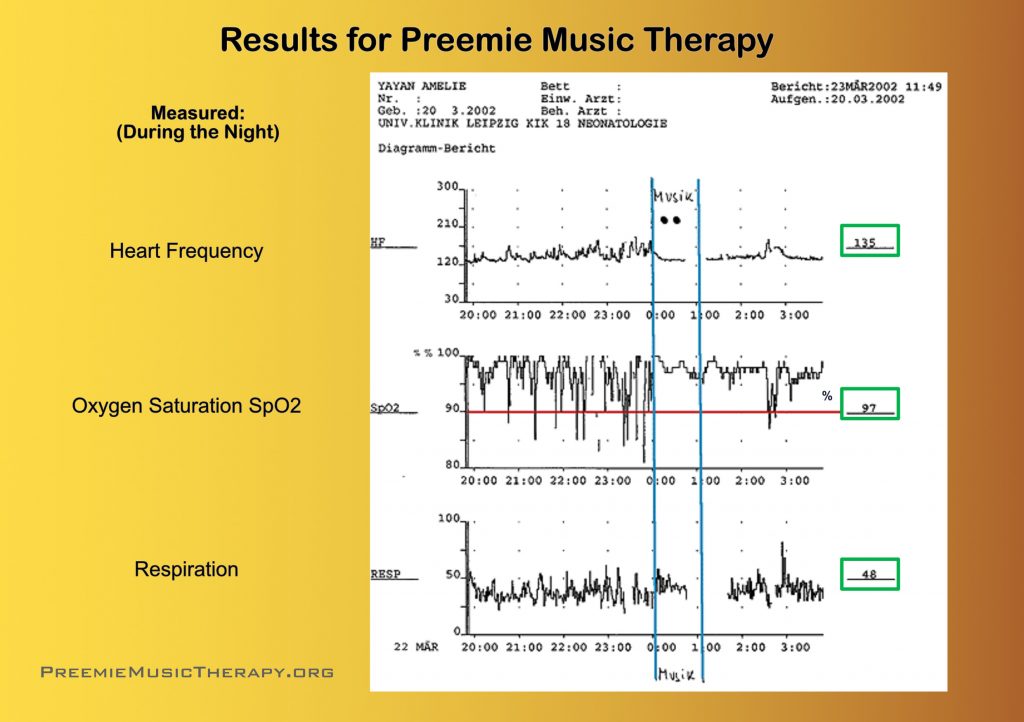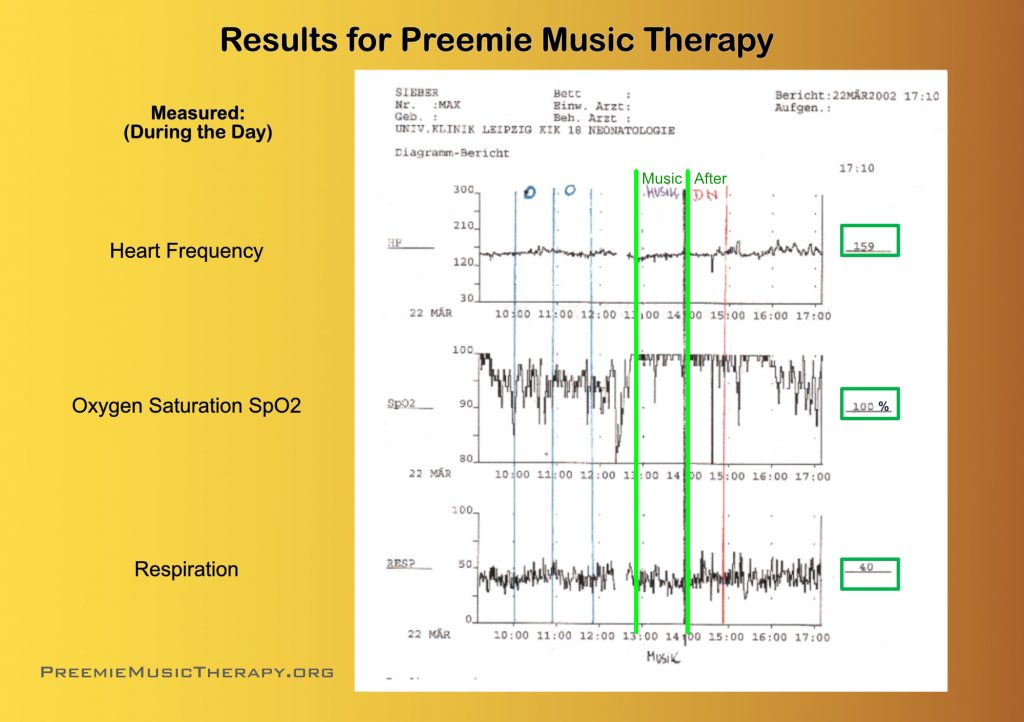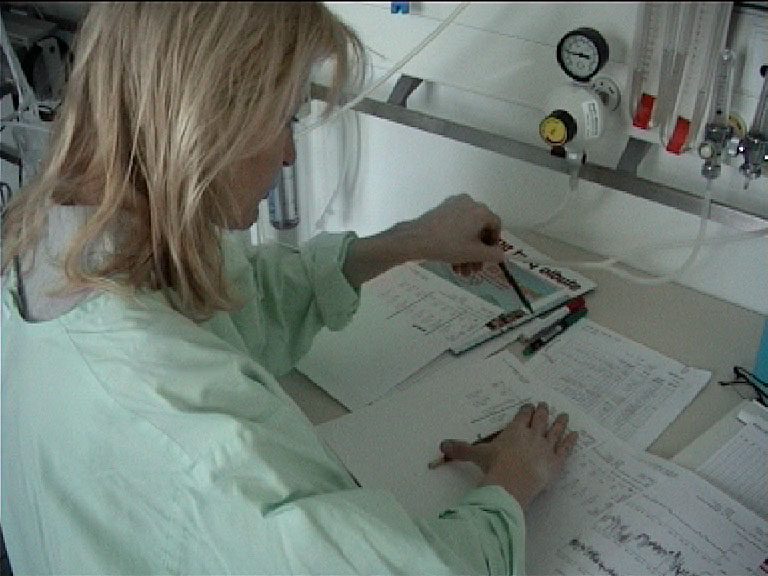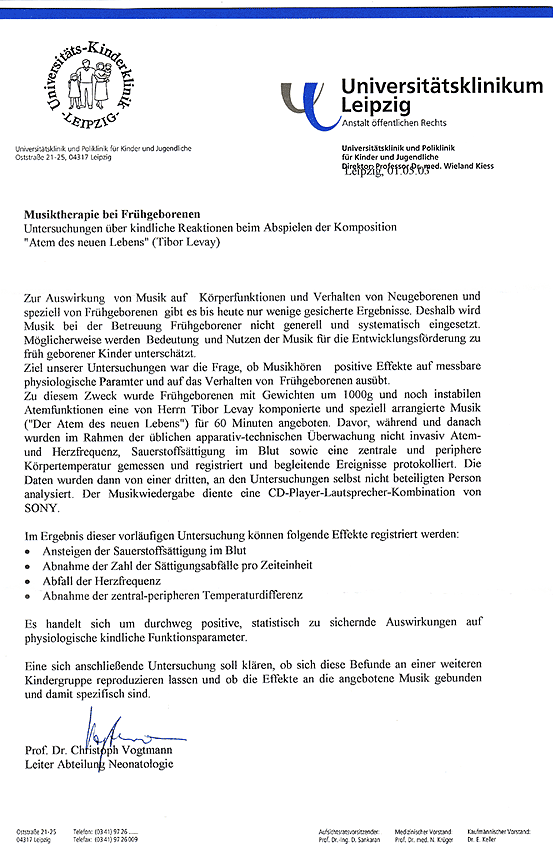Preemie Music Therapy
Improve your premature baby's oxygen saturation
Drops in oxygen saturation levels can cause physical and mental damages.
What Is Preemie Music Therapy?
Introducing “The Breath of a New Life”, a dedicated recorded preemie music therapy specifically designed to support the wellbeing of premature babies. This clinically proven music therapy has been trusted and used by NICU nurses and doctors in European Neonatal Intensive Care Units for many years and is now available as an medical audio device “Espero”. i.e.: “I Hope”.
Tibor Levay has created with this therapeutic music a supportive tool.

Proven Benefits
Improve Oxygen Saturation
Stabilise Heart Rate
Stabilise Breathing
Clinical Results of "The Breath of a New Life"
Yayan's Results
Yayan’s heart rate was at 175 BPM, when the music started it calmed and began to stabilise at 135 BPM.
Before the music her oxygen saturation was dropping down to 81% which is at a critical level. Once the music started it improved and reached a stable level at 95-97%.
Her breathing also became more stable at 48. Before the music it fluctuated between 55 and 27.
The positive effects remained for the next 40 minutes after the music finished playing.
At 2:30 AM she had a drop in her SpO2, her breathing raced to 79, and her heart rate reached 170 BPM.

Justin’s Results
Justin’s heart rate reached 208 BPM before the music started to play. Once it started to play it stabilised to 196 BPM.
Prior the music his oxygen saturation was unstable and dropping down to 85%. Once the music started it improved and was at a stable level at 96-98%.
His breathing also became more stable and lowered to 50. Where we can see that before it fluctuated between 75 and 40.
To test the versibility of the music under different conditions before the music started, the nurses did Justin’s care routine. After the music finished, Justin was breastfeeding.

Sieber’s Results
Sieber’s heart rate was stable before the music started to play at 165 BPM. During the music it was at 159 BPM.
Prior the music his oxygen saturation was unstable and dropping down to 80% which is the critical zone. Once the music started it improved and was at a stable level at 96-100%.
His breathing also became more stable and lowered to 40. We can see that before it fluctuated between 53 and 30.
The positive effects remained for the next 40 minutes after the music finished playing.
At 14:00 PM his SpO2 started fluctuating again, his breathing rate increased 65, and his heart rate reached 166 BPM.

Espero
Problem
One of the biggest problems preemies face is stress, which can make it difficult for them to breathe deeply. Environmental noises such as medical equipment alarms, personnel noise in the hospital, and later, at home, can set preemies under additional stress.
Espero
The "Breath of a New Life" is a clinically proven premature baby music therapy that has been trusted and used by NICU doctors and nurses for many years in European NICUs. Espero now available, providing parents with a tool to actively participate in their premature child's daily progress.
Objective
Stabilize emotional and cognitive development, stabilize respiration and heart frequency, and create a sheltered atmosphere for the baby through music therapy that absorbs high noise levels. It can be fully recognized even through the water barrier in the baby's ears, making it ideal for the later stages of pregnancy to have mother and child relaxed and connected.

Duration:
The music therapy is 43 minutes long, and its positive effects last for the next 40 to 60 minutes.
Application:
The music therapy is suitable for clinically stable preemies and is recommended for mothers with twins and those struggling with sleep. Information on how to apply the therapy can be found in the website. Espero can be used in Hospital and at Home.
How to Utilise the Therapy
Important information for the application of "The breath of a new life"
Important: The music shall be played quietly. (To adjust to the optimal volume, please play the music from approximately 10 minutes onward until you hear the vocal. Now adjust the volume until the vocal is hardly audible. Then start the music therapy from the beginning).
You can acquire a Mini Stereo installation. Please pay attention that the loudspeakers are installed in the incubator (or later at home) on the right and left side of the baby’s head away at 20-30 cm. See below.
There are a lot of doctors and therapists in hospitals for Neonatology who already work with music. Many of them are open to it. If this is not the case, you have to ask the permission from your doctor.
If you play the music with a portable stereo installation, which must not be in very close proximity of the infant, 2-3 m are enough. The sound of the music should be reduced in such a way that you can hardly perceive the music when you enter the room. If you still work with the monitor you can observe the reaction of your infant to the music.
It is clear that best results of all values (heart, lungs and oxygen) are visible and obtained when the infant, is in its mothers or fathers arm or is touched and stroked by its parents. The biggest stress the baby feels are during it’s care (washing, change nappies, during massage). You can play the music after the care.
The music plays for 42 minutes: The composition is a musical unity. On 70-75% of the children an immediate result is showing. After 15 minutes these amazing changes are still measurable: The values of the peripheral temperature have improved (i.e. hands and feet become warm). Precisely these values change again, so that after 40 minutes the peripheral values approach the central. For this reason the musical piece must be played without interruption as a unity.
Our experiences have shown all values remain stable for 40 to 60 minutes after the music has been played. This is why the music should be played 4 times a day. The best results are obtained during the time of rest (not during care of the baby, but after the care has been completed).
If your baby is very agitated you can repeat the play of the music once or twice more.
Our experiences have show that the children feel pleasant towards the music. Playing the music before midnight helps to have peaceful sleep.
If your child goes through a period of stress and you realize that he/she is nervous and agitated, you can play the music once or twice in the evening before going to bed and the night will be calmer.
Adults who wanted to experiment with this music listened to it before going to bed. They have told us about the effects with a profound relaxation and a calm night. We think that even for you, parents of prematurely born infants, who are stressed, this music can help. When listening to the music we recommend you lay on your back, hands and feet relaxed and simply let yourself go.
Clinical Research
Since December 2001 the Universitäts-Frauenklinik in Leipzig/Germany (Gynaecological University Clinic) under the direction of Professor Vogtmann brought into action the music therapy “the breath of a new life” and assigned it as a remarkable success. To conduct the clinical study, this music was directly placed into the incubator by using a small special stereo equipment for 43 minutes.
The music therapy could improve in a very natural way the breath and heart frequency, the oxygen content in blood and brain. It also improves the development of the temperature of the preemies and stabilize clearly even beyond the period of presentation.
The measuring parameters were compared statistically after the baby’s care during the period of stimulation (with music) and during control times (without music).
The basis of the statistical evaluations are documented on the diagrams of the reports by the University Clinic in Leipzig/Neonatology.

Oxygen Saturation
What happens when oxygen saturations drops?
The drops in oxygen saturation might cause mental disabilities or physical damages. E.g. Cerebral Palsy.
The graph shows the number of declines in the critical range of oxygen saturation between 80% and 90%.
The results indicate with the use of music therapy (minimal drops), compared without music.
i.e.: During a 60 hour period control without music there were 98 drops at 90% Saturation.
i.e.: During a 60 hour period experiment with music there were only 9 drops at 90%.
7 Premature Born Babies

Below shows the SpO2 drops of 3 preemies.
Green Lines mark where the music is played.
Oxygen saturation above 90% is optimal.

Medical Opinions
Professor Dr. Christoph Vogtmann
In charge of the neonatology division
University Clinic in Leipzig/Germany
Public Law Institution Universitätsklinik und Poliklinik für Kinder und Jugendliche Oststraße 2 1-25, 04317 Leipzig
Direktor: Professor, Dr. med. Wieland Kiess


Interview with Prof. Vogtmann (German)
“Music therapy with prematurely born infants
Investigations on reactions of infants when playing the composition “breath of a new life” (Tibor Lévay)
About the effects of music on body functions and behaviour of newborn children and particularly of premature infants today only a few secured results are known. Therefore the music is generally and systematically not used during the care of premature infants. Probably the meaning and importance for a stimulating development of premature infants with the use of music are underestimated. The goal of our investigations was the question whether the hearing of music has positive effects on measurable physiological parameters and on the behaviour of premature infants.
For this purpose premature infants with weights of around l000g and still with unstable breath functions were offered for 60 minutes one of Mr. Tibor Lévay composed and particularly arranged music (“the breath of a new life”).
Before, during and afterwards in the usual context of machine-technical monitoring, the breathing and heart frequency, oxygen saturation in the blood, as well as the central and peripheral body temperature were measured in a non invasive way and registered and accompanying events were logged.
These data were then analyzed by a third person, who themself was not part of the investigations. A combination of CD player and loudspeaker of SONY served for the rendering of the music.
In the result of this provisional investigation the following effects can be registered:
Rise of the oxygen saturation in the blood
Reduction of the decrease of saturation numbers per time unit
Decrease of the heart frequency
Approach of the peripheral – to the central body temperature
It refers throughout to positive effects which can be secured statistically on physiological infantile function parameters.
One later following investigation on a further group of children will clarify whether these results can be reproduced and whether the effects are bound to the offered music and thus are specific.”
Professor Dr. Christoph Vogtmann
Medical opinion:
Mrs. Dr. Monika Noecker Ribaupierre
“The Breath of a New Life”
– Music for prematurely born babies by Tibor Lévay
Acknowledging the constantly improving technical situation of the medical intensive care, the survival of more and more immature infants becomes possible – survival in the time of growth, in which all sense organs are developed so far that they can receive sensory impulses, which affects considerably the development.
With an intensity of up to 110 db especially the hearing system is extremely unphysiologicaly stressed by the technical surrounding noise of an intensive care unit.
This increases the stress of a newborn, which can be viewed and measured, and favours thereby the development of restraining effects of stress to the entire organism of a premature infant. The fact that music works on calming down and stress-reducing was documented by numerous studies, especially in the USA.
Tibor Lévay´s composed music differs from all others offered so far: It aims particularly at this situation, by including on the one hand the surrounding noises or rather absorbs them. On the other hand also this music corresponds to the acoustic needs of small children through the particular musical organization. With simple sounds and hummed or sung melodies, as well as soft instrumental accompaniment this world of sounds creates a reassuring and wrapping feeling.
Adults who listened to the music of Tibor Lévay judge it in such a way, as one wishes it for these children: “as if the feeling of separation disappears, one feels secured, full of love and longing, one is affected in the soul “.
The music was created as a gentle assistance and natural cure – a music, which mediates live. It is not a prescription and it replaces no live contact, above all it can not replace the parents – however it should not be missing on any intensive care unit, if at certain moments nobody can be there for the child.
Munich, May 2003
Dr. Monika Noecker Ribaupierre
dipl. Music Therapist
Industry Recognition
Visit our Industry Recognition page here, with further information and details.

Magazine for Child Nurses
The following pages discuss everything about our music therapy for premature babies, “The Breath of a New Life”. Including an explanation of our results measured in clinics.

1st International Congress for Music in Therapy, Medicine and Advice
The Breath of a New Life presented in Hamburg – Germany, in 2003. Presented by Ibolya Levay.

15th German Preemie Conference
The Breath of a New Life presented in Siegen – Germany in 2014. Presented by Tibor Levay.
Reviews
Letters from parents who used our music.
Our daughter came, in the 35th week of gestation, 26/07/2006 into the world, her lungs were not fully developed, she had a serious lung infection that required two blood transfusions and had two heart defects. I searched the Internet and came to this site, ordered this CD and played it to my daughter regularly which impressed me , the doctors + nurses also. As her breathing and her heartbeat normalized, less O2 was needed and both she and I relaxed. Two years have passed and we still listen to the CD almost every day to relax after a stressful day, just great.
Sabine
Preemie Music Therapy
Our Leonie came into the world four and a half years ago. In the 32nd week of gestation, her lungs were not fully developed and her heart rate frequency decreased. I searched for and ordered this CD immediately. Even in the hospital they were all thrilled. The CD is still routine listening after almost four and a half years. It is simply fantastic.
Heike
Preemie Music Therapy
